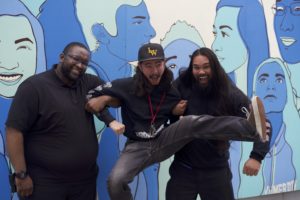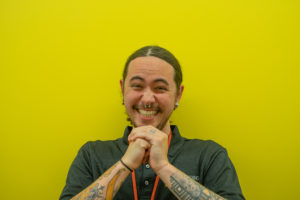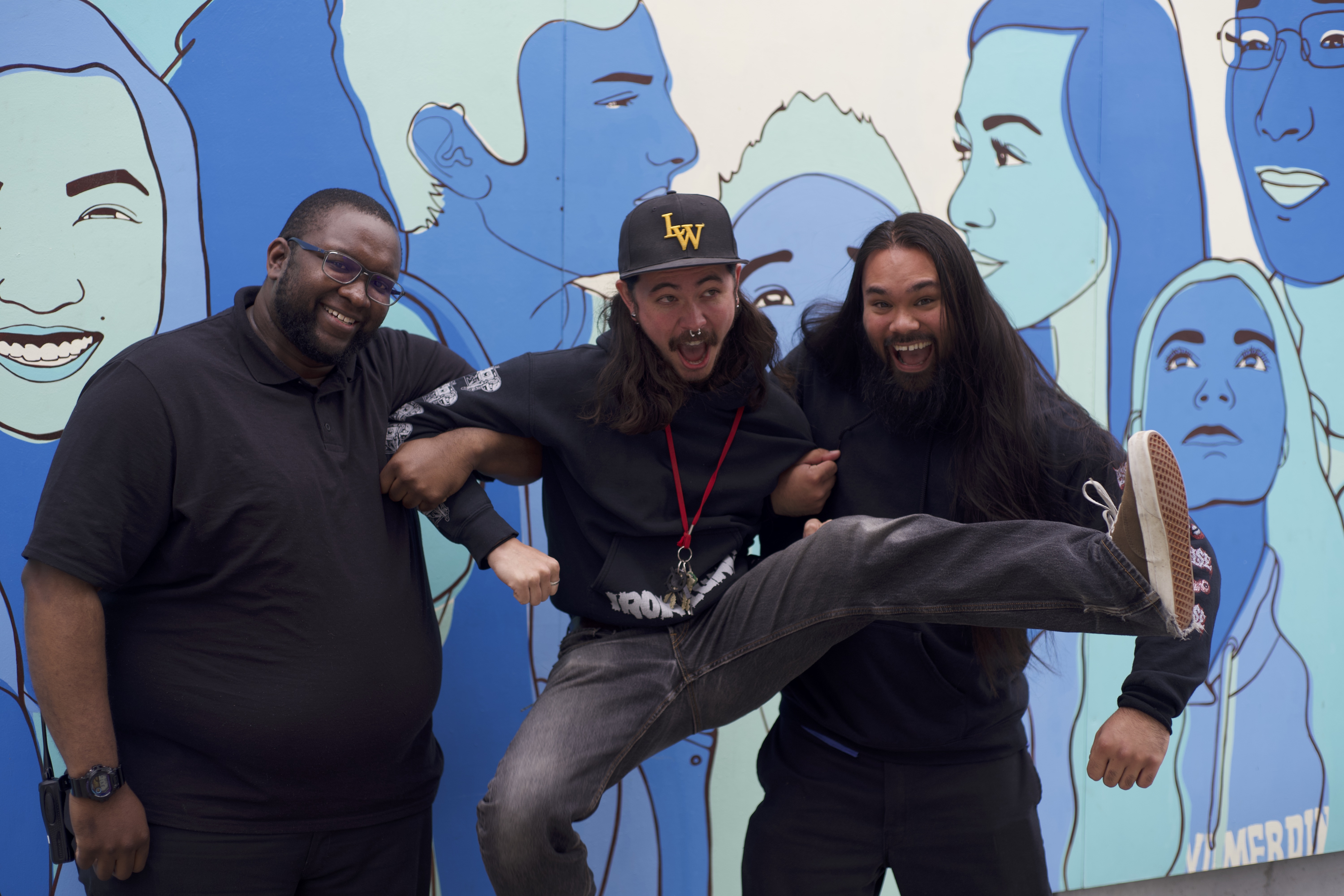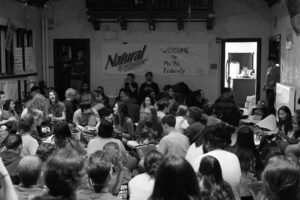Three members of Lick-Wilmerding High School’s Facilities Department are very talented musicians.
Ryan Daniel, who until recently was Lick’s Custodial Supervisor (he has left Lick to work at the YMCA), has played the guitar since he was a child and toured the East Coast and the American South with his former band “Ion.”
Mark Wallace, one of Lick’s School Safety and Security Monitors, sings for his death metal band, “Cartilage” and will be on tour in Europe this summer.
Maurice Williams, Lick’s other School Safety and Security Monitor, is a songwriter and producer. In 2016, Williams was named one of the Bay Area’s top 20 music producers by All Bay Music magazine. He has also worked with the likes of Kid Rock, Nicole Scherzinger of the Pussycat Dolls, and Jabari Tawiah, a Grammy award winning producer.
Mark Wallace
Mark Wallace began his music career when he picked up a flute in fifth grade; in sixth grade he tried the trumpet; in seventh grade a blues guitar. It wasn’t until he began singing in tenth grade that Wallace found his place in the musical world.
“I had a dream one night. I saw all of my friends playing instruments on a stage and I was doing vocals. Not once did I ever see myself being a vocalist or [had I before] tried to be a vocalist. So in the dream it was really weird. I was like, ‘Wow! I can see myself being a frontman…’So I brought that dream to reality. I told my friends about it and then everyone was like ‘Oh, let’s jam!’”
After that determining dream, Wallace began singing for a death metal band made up of his sister Teresa (goes by Ria) and three high school friends.
Wallace said that he and his sister have “a fantastic relationship. My sister’s my best friend — and also the guitarist in the band I’m in.”
Singing as the front man for the group worked for Wallace and the band. “It clicked because no one else wanted to sing, no else could do it, and I’m obnoxious. It just worked that way.”
Mr. Riggs, Wallace’s photography teacher at Mount Diablo High School, broadened Wallace’s creative thinking. Mr. Riggs, “opened my mind to music, art, and was also very influential in [getting me] thinking outside the box. Like really searching for something that means more to the human soul than materialistic things.”
Mr. Riggs introduced Wallace to classical music, a fundamental step in Wallace’s musical career. “Coming from middle school, I had a group of friends who listened to more of like hip hop and R&B kind of stuff… ninth grade, my freshman year, that’s when I started becoming friends with people who shared the same musical taste, which was metal at the time.”
“[Mr. Riggs] was into Baroque era and Romantic period classical music. I always thought of it as background music, until one day he was playing some Bach in class. I was listening to one piece that was a minute thirty seconds. I was like ‘Oh my god, this shreds and it is super fast. Mr. Riggs, what is this?’ And he was like, ‘Well, here, borrow this CD, give it back to me.’ So I went home, burned it, and I could not stop listening to that. It was like a greatest hits kind of thing of Bach. From then on I wanted to pursue more classical music. I think classical music is really the roots of most music nowadays, of course. Especially with technical, and heavy, and fast death metal. So classical music for me, from Mr. Riggs, is what sparked this feeling that I need to do faster and heavier stuff.”
Wallace’s interest in listening to and making faster, heavier metal grew. This led Wallace, Ria, and another friend, Louise, to create a new band called “Necromantic Decay.”
Necromantic Decay would play some “dinky” shows every once in a while. It wasn’t until the group changed the name of the band to “Feast,” Wallace graduated from high school, and they began writing heavier metal songs that the band started to take off. Soon the group was featued in the press and receiving guaranteed pay. The sold merchandise, and packed venues.
During the process of becoming more serious, Feast added two new musicians: Taylor Holt on guitar and Nick Wilbrand on bass. “They provided a more proficient and technical aspect. They were mad men.”
After Feast disbanded, Wallace devoted more time to a side project he had been working on with his sister’s boyfriend, Mike Flory, who played guitar, and another friend, AJ, on drums. The group was called “Septicemia.” It was “a brutal slamming, caveman, death metal band… Septicemia was sick.”
In 2013, after stepping away from Septicemia, Wallace, his sister, and her boyfriend Mike started Wallace’s current band, “Cartilage.”
“[The] idea and name for the band came up just out of high school. I was like ‘Oh man, I want to be in a theatrical, gore soaked, death metal band of sorts.”
Cartilage captures some of Wallace’s favorite unique aspects of death metal. “I would listen to things like Bon Jovi and I’m like ‘Yeah, it gives me hope and it gives me that energy like, yeah!’ But then I was like, ‘Man I need something heavier. Something that’s faster, more aggressive.’”
Despite Cartilage’s success, Wallace still finds time for his many hobbies.
“I make bullwhips. Nylon bullwhips. I like to crack them recreationally.”
Why do you like music?
“The darker aspects of life attracted me [when I was younger], because no one else was attracted to them. And also because it just fascinated me. I’m like, ‘Who would want to do such horrible things.’ And I loved horror movies. I was brought up with tons of horror movies when I was little. So I guess the darker stuff kind of stuck to me. A lot of it has to do with the faster, hard rock stuff my dad would listen to sometimes. Like some of the Van Halen stuff would get pretty heavy. So that influenced me too.”
“I found that [death metal] had dark lyrics and stuff. So you take a band like Cannibal Corpse and they have an album called ‘Tomb of the Mutilated’ and there’s a song on there called ‘Hammer Smashed Face.’ It’s like you got those dark things and you would think it would make someone mean and angry, like ‘Ooh, I’m this brooding barbarian guy.’ But no, what it does is it gets you excited, it gets you happy. I’ve never been to a metal show where someone is just flat out angry and mad and sad and upset. Everyone has a smile on their face. Everyone is stoked to see the band.”
“I like music because it gives me a certain feeling playing that nothing else can give me. No amount of food, no amount of exercise, no amount of gaming, no amount of travel can give me the feeling that music can give me.”
“Excitement. Sadness. Music touches on all feelings that the human body can experience emotion wise. So I’ll listen to a song by Blind Guardian that’s about fairy tales and stuff. And for whatever reason it will make me cry my eyes out. I can listen to a song by Slayer that makes me so stoked out of my mind that I just want to run around screaming at people. But then I’ll listen to a song from Camel that talks about a farm, about being on a farm, and it will make me just extremely happy, like ‘Dude, I’m stoked off life. I want to work on a farm!’”
“When I go on stage, I am not on this planet.”
“I play music to express who I am and what I think and how I go about being Mark Wallace.”

Maurice Williams
At age 15 Maurice Williams bought a Casio WK-1800 keyboard with the money he had saved up from working his first job at McDonald’s. That’s when he began making music.
“I was just playing around [on the keyboard]. I never had any training with piano, drums, anything. I was figuring out that system and making beats for friends. Then it went from there.”
Initially, Williams would make beats on the keyboard and leave the songwriting completely to his high school friends. But by the age of 18, Williams was taking his weekly pay and homemade beats to The Grill Recording Studios in Emeryville in order to write and to learn how to produce his own songs. At The Grill, Williams would bring in the beats he had made at home and play them for the owner of the studio, a man he only knew as Lev (his full name is Lev Berlak).
“I learned so much from Lev,” Williams said. Lev “basically taught me to how to form music: from intro to your first verse, to chorus, to bridges, and actually how to manipulate sounds and build my own sounds.”
At The Grill, Williams’s interest in music grew in many directions. “Once I turned eighteen, I bought more equipment,” Williams said. He bought hardware such as a Roland Juno D — a synthesizer — and an EMU MP7 — a drum machine.
He also bought software such as Pro Tools (a recording program) and Wave Plugins, which are “your EQs, compressors, reverb, tape saturation, all you need to make your sounds come out lush and more presentable,” Williams said.
Williams focuses a lot on whether or not his music is “lush.” For Williams there are two main aspects of “lush:” how a song sounds for others and how it feels to him.
“Lush is that feeling of the stereo in your face,” Williams said. He continued, “Sometimes you can record music on a program and it’s soft and silent, [which means] you need to bring your sounds up to industry level. Industry level is something you can play on the radio, or in a club, or in a car, or on your cell phone so that it comes through.”
But on a personal level, “lush” means something else to Williams, “There is [a feeling I get]. It’s hard to explain. It’s more like, you hit the kick drum and there’s that thump in your chest that it brings out. It could bring out happiness, it could bring out sadness, [it depends on] the way that you play the music.”
When Williams goes into the studio, he doesn’t have a specific sound or song in his head. Williams goes in, and “I kind of just play around.” However, he does have one goal in mind: “I always grew up thinking people should smile,” Williams said.
Williams grew up through some hard times: “A bunch of moving around as a youth, and witnessing certain things such as domestic violence, and living through times where we [his family] didn’t have things.” He connects his experiences from his childhood to his work at Lick: “I felt those things as a child. So I see you guys [Lick students] and it’s like, Hey, let’s make everybody smile.”
Currently. Williams is working on several projects: he sells the beats he makes at home to local artists for anywhere between $500 and $5000; he is song writing and producing for the singer Rafael Andrews, who will soon drop a four song EP; and he is promoting Dondria Nicoles’, signee of Jermaine Dupri’s So So Def Recordings, newest single “Crush.”
He runs the promotion campaign through his instagram, @williamburns.
The handle is a combination of his last name and a nickname his uncle gave him when he was little. The nickname was Shorty Burns. As in, “when I was a kid I went by Shorty Burns, because I had a little pyro in me… [the biggest thing I set on fire] my plastic Hulk Hogan wrestling figurines… I would build a little bonfire.”
Why do you like music?
“Music brings a feeling. It’s emotional. Like you can have a bad day and you can hear a song that will remind you of something and it will change your day. Or it will help you with a release of your stress from that day. I believe music brings people together. Just like food does. You can dance, you can have fun, or it brings up conversation as well about a song. Like, ‘What do you think about this artist?’ Or. ‘I don’t like this artist.’ ‘Tell me why.’”
“Music is based off of a feeling. A lot of people go through things. What do people do? Turn on their music. They may not know how to express their feelings, but they’ll go to one particular artist of theirs, and they’re like ‘Wow, they know how it feels, because I don’t know how to express myself!’”
“[Music] brings back memories of my father. Just being around him. Have you Seen Her by The Chi-lites. That was like a song he would play all of the time. We would go fishing. On the way there, on the way back, during fishing [he would play that song].
“Music is a big draw to emotion. It’s a good release. It helps me, with stresses I may go through; and just to get into my studio and make music feels good.”

Ryan Daniel
Ryan Daniel began playing the guitar at nine. However, he didn’t fall in love with music until sixth grade, when he discovered rock ‘n roll.
“Just being a curious person, rock ‘n roll was something different. It was dangerous. When you are a kid, you know, you are learning the routines of society, which we all abide by, for good reason. But, there’s something very dangerous about rock ‘n roll… It was intriguing to potentially be part of something, a musical scene, that kind of went away from the regulations of what we are being taught when we are young adults and young people.”
Daniel’s passion for rock ‘n roll inspired him to begin playing the guitar more seriously.
Initially, he would pull out his guitar from “the back of [his] closet” every once in a while, to play. Then, as his passion for music grew, he “started leaving the guitar out” around his house.
Finally, “at one point I just started leaving it out on a stand in my room and just kept picking it up.” By the time he entered high school, music consumed his time. “I would practice from two to six hours on [any given] day.”
During middle school and high school, Daniel took private lessons and participated in after-school music programs. He also played in bands and performed at talent shows.
Daniel took lessons from Eric Lenchner, a man known around the Bay Area as Professor Sludge (sludge metal is a music genre that combines doom metal and hardcore punk).
“I took lessons from him, on and off, starting at nine, and then stopped for a while. Then after a few years I started paying for them [the lessons] myself and then I went back for a little while, and then stopped and started. There was a lot of stop and start… But I learned a lot from him.”
When Daniel’s father passed away, Lenchner played at his funeral. “He played at my dad’s funeral when we asked him to,” Daniel said, “He’s a good guy. He’s pretty awesome. He had a glitter, a custom glitter guitar, that’s like neon purple and green. He had a suit to match. That’s bold.”
Until recently, Daniel was the leader of the band “Ion.” “Ion,” Daniel explained, because “not many bands start with [the letter] I.” When the group was together they performed at venues around the Bay Area, went on tour, and put out albums. Ion’s most recent album contains three songs, the shortest of which is about 18 minutes long.
When making his own music, Daniel loves to pull sounds from his daily life. “I’m a weirdo, man. One of my old jobs had this soda machine, and it would fire up to refrigerate and I would be like, ‘Oh man I got to record that and use that found sound.’ I literally like a lot of noise stuff. There’s records you can buy that are like ambient noise. Some of them are really harsh. People kind of think that’s weird sometimes. It probably is. But I equate it to somebody using a white noise machine or something. The only difference is that I am not necessarily trying to fall asleep. I’m just throwing on some noise and hanging out.”
Why do you like music?
“[Rock ‘n roll] is controlled chaos… It’s socially acceptable. It’s fascinating just the way it works. You couldn’t behave certain ways in certain situations. Rock ‘n roll is like watching standup comedy: You couldn’t tell certain jokes just in the daily routine, in the daily day to day, in the workspace, or in school. There’s a time and place for it: 45 minutes on a stage. For a comedian that’s what it is. For a musician that’s what that is: just cut loose and kind of let out frustration and emotion; and again with rock ‘n roll it’s just very dangerous. That’s the one thing I can remember, just feeling it [the danger]. There’s something very taboo about it. It [feels] like, ‘My parents aren’t going to like this.’”
“If you play in a band with a bunch of musicians and stuff, you’re going to build chemistry naturally. So things start to sound different. You start to grow with each other and you start to understand each other’s tendencies more and more. It’s this unspoken way of communication. There’s not many ways you can do that. It transcends language really. So it’s fun to just experiment and communicate in a way that’s not so particular.”
“Music is expression. I’m not the most outspoken person, so it’s a way for me to communicate, for sure, just do my own thing without being so articulate, and just kind of feeling it out. Some people go to the gym and I totally get that too, exercise is a good one. I write a lot — music is a way to deal with daily life and your emotions in a constructive, positive way. It’s all about personal growth, positivity, expression, relief, therapy. Music is all of those things. The daily grind of things in general is the root of all of those expressive arts and music for me.”
“You almost get a tingling sensation or butterflies sometimes. Maybe even a chill, some people might call it. There’s some kind of reaction that happens. Again, I’m just a curious person. So when things happen that are outside of the normal — I’ll even touch on the school’s [Lick’s] mentality of leaning into discomfort — that sense of danger that comes with it is just very appealing.”
Williams focuses a lot on whether or not his music is “lush.” For Williams there are two main aspects of “lush:” how a song sounds for others, and how it feels to him.
“Lush is that feeling of the stereo in your face,” Williams said. He continued, “Sometimes you can record music on a program and it’s soft and silent, [which means] you need to bring your sounds up to industry level. Industry level is something you can play on the radio, or in a club, or in a car, or on your cell phone so that it comes through.”
But on a personal level, “lush” means something else to Williams, a certain feeling. Williams said, “It’s hard to explain. It’s more like, you hit the kick drum and there’s that thump in your chest that it brings out. It could bring out happiness, it could bring out sadness, [it depends on] the way that you play the music.”
When Williams goes into the studio, he doesn’t have a specific sound or song in his head. In the studio, Williams “play[s] around.” However, he does have one goal in mind: “I always grew up thinking people should smile,” Williams said.
Williams grew up through some hard times: “A bunch of moving around as a youth, and witnessing certain things such as domestic violence, and living through times where we [his family] didn’t have things.” He connects his experiences from his childhood to his work at Lick: “I felt those things as a child. So I see you guys [Lick students] and it’s like, Hey, let’s make everybody smile.”
Currently, Williams is working on several projects: he sells the beats he makes at home to local artists for anywhere between $500 and $5000. Williams is currently writing and producing songs for the singer Rafael Andrews, who will soon drop a four song EP. Williams is also promoting Dondria Nicoles’, a signee of Jermaine Dupri’s So So Def Recordings. Her newest single is called “Crush.”
Williams runs the promotion campaign through his instagram, @williamburns.
The handle is a combination of his last name and a nickname his uncle gave him when he was little. The nickname was Shorty Burns “because I had a little pyro in me… [the biggest thing I set on fire] my plastic Hulk Hogan wrestling figurines… I would build a little bonfire.”
Why do you like music?
“Music brings a feeling. It’s emotional. Like you can have a bad day and you can hear a song that will remind you of something and it will change your day. Or it will help you with a release of your stress from that day. I believe music brings people together. Just like food does. You can dance, you can have fun, or it brings up conversation as well about a song. Like, ‘What do you think about this artist?’ Or. ‘I don’t like this artist.’ ‘Tell me why.’”
“Music is based off of a feeling. A lot of people go through things. What do people do? Turn on their music. They may not know how to express their feelings, but they’ll go to one particular artist of theirs, and they’re like ‘Wow, they know how it feels, because I don’t know how to express myself!’”
“[Music] brings back memories of my father. Just being around him. Have you Seen Her by The Chi-lites. That was like a song he would play all of the time. We would go fishing. On the way there, on the way back, during fishing [he would play that song].
“Music is a big draw to emotion. It’s a good release. It helps me with stresses I may go through, and just to get into my studio and make music feels good.”
Ryan Daniel
Ryan Daniel began playing the guitar at age nine. However, he didn’t fall in love with music until sixth grade, when he discovered rock ‘n roll.
“Just being a curious person, rock ‘n roll was something different. It was dangerous. When you are a kid, you know, you are learning the routines of society, which we all abide by, for good reason. But, there’s something very dangerous about rock ‘n roll… It was intriguing to potentially be part of something, a musical scene, that kind of went away from the regulations of what we are being taught when we are young adults and young people.”
Daniel’s passion for rock ‘n roll inspired him to begin playing the guitar more seriously.
Initially, he would pull out his guitar from “the back of [his] closet” every once in a while, to play. Then, as his passion for music grew, he “started leaving the guitar out” around his house.
Finally, “at one point I just started leaving it out on a stand in my room and just kept picking it up.” By the time he entered high school, music consumed his time. “I would practice from two to six hours on [any given] day.”
During middle school and high school, Daniel took private lessons and participated in after-school music programs. He also played in bands and performed at talent shows.
Daniel took lessons from Eric Lenchner, a man known around the Bay Area as Professor Sludge (sludge metal is a music genre that combines doom metal and hardcore punk).
“I took lessons from him, on and off, starting at nine, and then stopped for a while. Then after a few years I started paying for them [the lessons] myself and then I went back for a little while, and then stopped and started. There was a lot of stop and start… But I learned a lot from him,” Daniel said.
When Daniel’s father passed away, Lenchner played at his funeral. “[Lechner]’s a good guy. He’s pretty awesome. He had a glitter, a custom glitter guitar, that’s like neon purple and green. He had a suit to match. That’s bold.”
Until recently, Daniel was the leader of the band “Ion.” “Ion,” Daniel explained, because “not many bands start with [the letter] I.” When the group was together, they performed at venues around the Bay Area, went on tour, and put out albums. Ion’s most recent album contains three songs, the shortest of which is about 18 minutes long.
When making his own music, Daniel loves to pull sounds from his daily life. “I’m a weirdo, man. One of my old jobs had this soda machine, and it would fire up to refrigerate… I would be like, ‘Oh man I got to record that and use that found sound.’ I literally like a lot of noise stuff. There’s records you can buy that are like ambient noise. Some of them are really harsh. People kind of think that’s weird sometimes. It probably is. But I equate it to somebody using a white noise machine or something. The only difference is that I am not necessarily trying to fall asleep. I’m just throwing on some noise and hanging out.”
Why do you like music?
“[Rock ‘n roll] is controlled chaos… It’s socially acceptable. It’s fascinating just the way it works. You couldn’t behave certain ways in certain situations. Rock ‘n roll is like watching standup comedy: You couldn’t tell certain jokes just in the daily routine, in the daily day to day, in the workspace, or in school. There’s a time and place for it: 45 minutes on a stage. For a comedian that’s what it is. For a musician that’s what that is: just cut loose and kind of let out frustration and emotion; and again with rock ‘n roll it’s just very dangerous. That’s the one thing I can remember, just feeling it [the danger]. There’s something very taboo about it. It [feels] like, ‘My parents aren’t going to like this.’”
“If you play in a band with a bunch of musicians and stuff, you’re going to build chemistry naturally. So things start to sound different. You start to grow with each other and you start to understand each other’s tendencies more and more. It’s this unspoken way of communication. There’s not many ways you can do that. It transcends language really. So it’s fun to just experiment and communicate in a way that’s not so particular.”
“Music is expression. I’m not the most outspoken person, so it’s a way for me to communicate, for sure, just do my own thing without being so articulate, and just kind of feeling it out. Some people go to the gym and I totally get that too, exercise is a good one. I write a lot — music is a way to deal with daily life and your emotions in a constructive, positive way. It’s all about personal growth, positivity, expression, relief, therapy. Music is all of those things. The daily grind of things in general is the root of all of those expressive arts and music for me.”
“You almost get a tingling sensation or butterflies sometimes. Maybe even a chill, some people might call it. There’s some kind of reaction that happens. Again, I’m just a curious person. So when things happen that are outside of the normal — I’ll even touch on the school’s [Lick’s] mentality of leaning into discomfort — that sense of danger that comes with it is just very appealing.”






